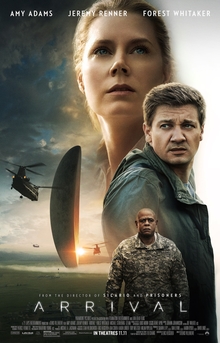
Like pretty much everyone who has read Ted Chiang’s Story of Your Life, I greeted the news of it being adapted into a film with incredulity. I loved the story and I’ve considered Chiang to be one of favorite science-fiction authors ever since I read Understand, but it seemed unfilmable to me. Having Denis Villeneuve as the director didn’t fill me with confidence either. He’s clearly talented and is very cerebral and my reaction to his films has always been mixed. Still, this was one film I absolutely must watch and was duly frustrated that while it was released in November in the US I needed to wait until January this year for it to come to Malaysia. Note that this post will be full of spoilers, so consider yourself warned.
Louise Banks is a world renowned professor of linguistics who is called in to assist when extraterrestrial spacecraft appear on Earth. Twelve of the ships are scattered around the planet causing governments to scramble to send their best experts to decipher their secrets and try to communicate with the. In the US, Banks is paired with physicist Ian Donelly and tasked with finding out the purpose of the aliens’ visit. Banks makes a breakthrough by trying to communicate using a written language rather than a spoken one and learns that the aliens use complex circular symbols. While all this is going on, Banks keeps receiving visions of a young girl that she later realizes is her daughter. It seems that learning the aliens’ language causes her to start to think like them, which in this case means sharing their non-linear perception of time. This ability changes her life, both in the personal sense, and in the wider sense as tensions rise throughout the world due to the suspicions over the aliens’ intentions and she has to find a way to convince the world of the benign nature of the aliens.
As everyone reports, this is a great science-fiction film and a far better adaptation that anyone has any right to expect. In a number of ways, it’s straight up better than the original story. The setup that they employ to talk to the aliens for example is far more atmospheric and using circles as the base of the aliens’ written language is an inspired design decision. I was also pleased that many of the anecdotes come straight from the story and how well they are executed here, including the kangaroo story and the daughter asking Banks for a more sciency version of win-win situation. Most of all, I’m tremendously happy that it keeps the essentials of being a first contact story with a linguist in the starring role that doesn’t end in violence. It’s deeply philosophical, reasonably intelligence (I loved how plausible the software they use to draw the alien symbols look) and I suspect that it should be pretty emotionally hard-hitting to those who haven’t read the story.
My problem is that I have read the story, many times in fact. This is exacerbated by how Villeneuve frames the reveal as a twist as he is wont to do in his films. The audience is clearly meant to believe that the visions are flashbacks and so should be shocked when they are revealed to be flashforwards instead. Due to this I didn’t have much of an emotional reaction to the film and greatly prefer how the short story has no twist. Everything is obvious from the beginning and the impact comes from all of the elements gradually building up to the predictable but inevitable moment.
A deeper objection is that the film dramatically changes the philosophical implications of the short story. This is captured in the single most important change that was made. In the film, the daughter dies while still a child from a rare disease, with the implication that she is destined to die as soon as she was born. In the short story, the daughter dies as an adult after having just started working due to an accident while mountain climbing. In the case of the former, it is understood that Banks could have avoided the death only by ensuring that the daughter was never born at all but she chose to do so anyway as she felt it was worth it. In the latter case, though the situation itself is an avoidable one, she is unable to take action to do so because she has foreknowledge of it. The essence of the short story is that free will is incompatible with foreknowledge. In fact, it is even impossible for anyone with future knowledge to even claim or hint that she has such knowledge. This is very much not so in the film. I’m not certain that the film version is actually inferior but it can’t be denied that it is different.
While it’s not a perfectly faithful adaptation, Arrival remains a fantastic film that epitomizes all that is great about science-fiction. It makes for an especially good comparison with Interstellar, another science-fiction film which tries so hard to be philosophically deep and emotionally powerful but ends falling flat because it is so dumb and so blunt about manipulating the emotions of the audience. Hey Nolan, this is what truly intelligent science-fiction looks like.
2 thoughts on “Arrival (2016)”